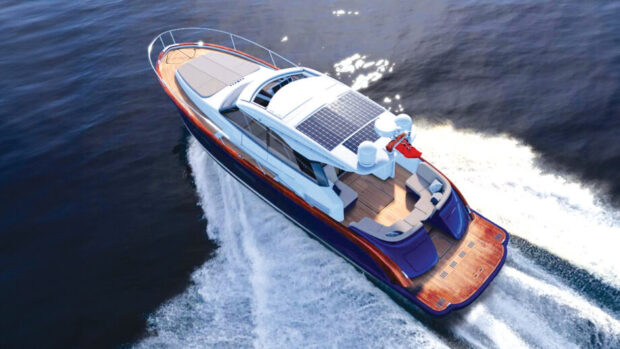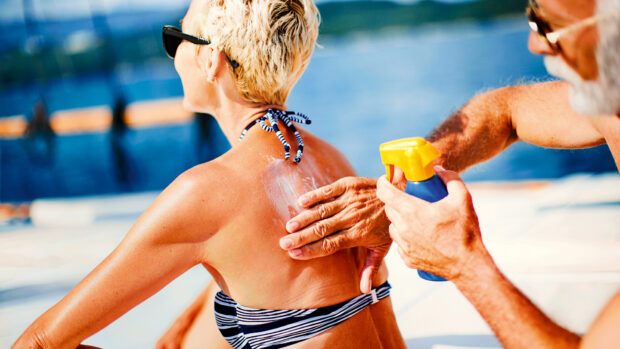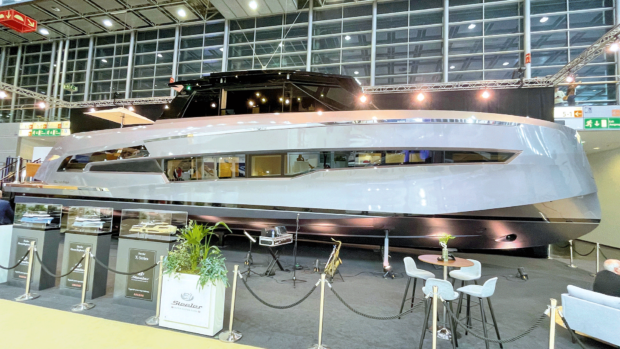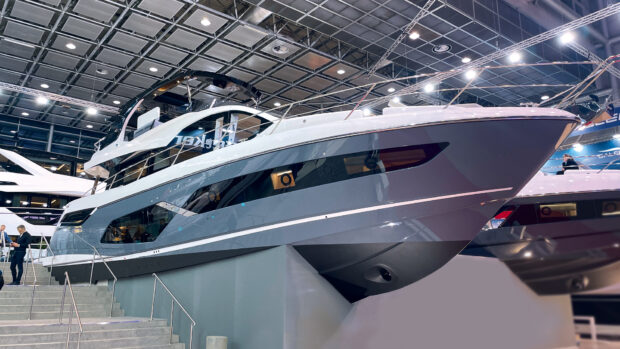Our resident used boat expert Nick Burnham picks out four of the best all-weather boats on the secondhand market, from Aquastar to Sargo…
It’s December. The days are short, commutes are in the dark and the shops are full of Christmas tat/cheer (delete as appropriate). The seas are winter choppy but down at the boatyard all is quiet.
Winterised boats hibernate beneath tarpaulins, frost-guard heaters and dehumidifiers keeping the worst effects of the cold and damp at bay.
Boating, for the majority of us, is on hold for the foreseeable future, our expansive open cockpits and huge sunpads ill-suited to the chilly weather and turbulent seas of another long off-season.
Most of us, but not all. Because there are boats that are perfectly suited to inclement weather and rough seas. Boats that will allow you to confidently go boating all year round. All-weather boats like these…

Dale Nelson 38
Built: 1999
Price: £162,500 (ex. VAT)
I had a fascinating conversation recently with the skipper of a pilot boat that runs pilots out of Belfast to the big ships heading into port, irrespective of weather. The boats they use are based on Nelson hulls, the same type of hull that underpins this Dale Nelson.
Interior
Normally when I speak to brokers for this feature, I get a quick chat and a few photos sent. For this boat I got a personal email from Dale Nelson director Mike Reynolds, with reams of detailed information about a boat they built over 20 years ago!
The second aft cabin Dale 38 constructed, it was built for a Norwegian customer who specified a dark-stained mahogany interior (ensuite owner’s cabin aft, guest cabin forward, dinette opposite the galley on the lower deck and wheelhouse/saloon on the main deck).
Mike tells me that oak or American cherry are more usual, with a couple of examples in teak.

Dark-stained mahogany goes well with blue upholstered saloon on the main deck
Exterior
A classic ‘pilot boat’ profile, this boat has an almost commercial vibe to it. The mast folds to lower air draught to 3.25m for canals.
Performance
Twin Volvo Penta TAMD 63P engines are fitted. Expect about 26 knots flat out.
Seakeeping
Mike again: “They perform exceptionally in large seas and I have been out in 49 knots of breeze on our way up to Ardfern in Scotland and then rather than punching large breaking head seas we just turned 60 degrees off and ran at 24 knots across the breaking waves to the lee of Ilsa.
“At speeds of 18-20 knots in these seas the boat rides virtually level across and up the face and across and down the back of the wave even if they are breaking waves.
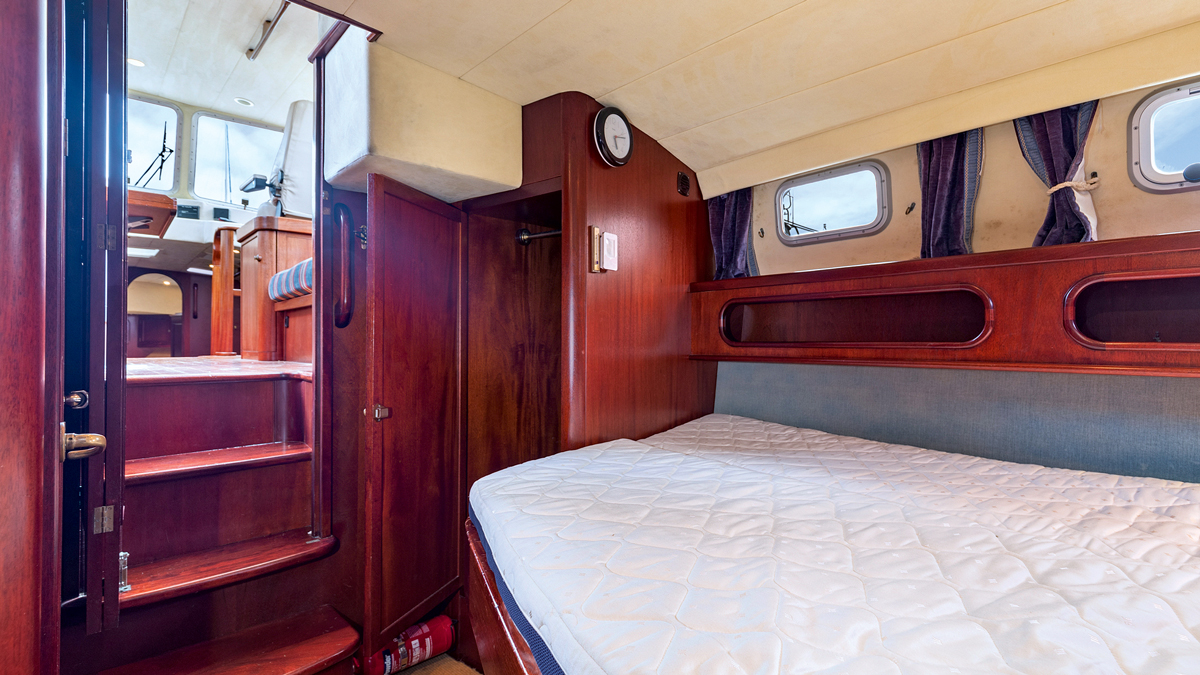
Owner’s aft cabin is a good size with useful locker space and its own ensuite heads
“In following seas I always keep the speed up; if you are doing more than 18 knots then you are as fast as the waves and you can then drive down the face of the wave and up the back of the next one.
“In all the time that I have been on these boats – over 1,500nm on delivery or collection trips – there has never been any question about the handling.”
Specifications
Length: 39ft 9in (12.1m)
Beam: 12ft 4in (3.7m)
Draught: 4ft 0in (1.2m)
Displacement: 12 tonnes
Fuel capacity: 1,363 litres
Engines: Twin Volvo Penta TAMD 63P 370hp diesels
Location: Neyland
Contact: Dale Nelson
Article continues below…

Secondhand buyers guide: Best wheelhouse and walkaround boats

Secondhand boat buyers’ guide: 4 of the best offshore boats for sale
Botnia Targa 35
Built: 2003
Price: £160,000
Sat right in the middle of Botnia’s Targa nine-strong range of boats that span 23ft to 46ft, the Botnia Targa 35 epitomises all that is great about these boats.
It’s a model that originally launched in 1998, and remained conceptually unchanged until 2005 when Botnia introduced two significant improvements available as options; the ‘+’ with extended transom (which adds 2ft to the hull length extending the waterline and engine bay plus a more attractive reverse sheer sloping transom) and the HiFly flybridge (which moved the original smaller flybridge from behind the wheelhouse up to the roof of the wheelhouse, giving significantly more space and seating).
As ever though, while the concept remains intact, Botnia is always refining its models.
Interior
A walkaround boat, the Targa 35 wheelhouse/saloon is accessed via twin sliding doors either side of the internal helm. There’s a small galley forward to port which is mostly a twin-burner hob and a sink, with the fridge beneath one of the helm seats.
Further aft, a table slides down a pole to turn the L-shaped settee into a dinette. The lower deck layout is intriguing, split between an aft cabin with a single and double berth plus the heads, and a forecabin with two single berths.

Aft cabin on lower deck is functional but comfortable with a single and small double
Exterior
No slave to convention, the main cockpit area is actually forward of the wheelhouse, where a deep U-shaped seating area nestles into the bow.
The aft deck lifts to provide engine access but also creates more outside social space, and finally there is a small flybridge built into the trailing edge of the wheelhouse roof. 2011-on boats had the option of a Comfort Fore Cabin which sacrificed the forward cockpit for a larger cabin.
Performance
All twin Volvo Pentas, later boats got D6-350 or D6-370 engines with a few of the last getting D6-400s. Pre-2004 boats (like this one) got the venerable and well-proven KAD300 motors at 285hp each for a top speed of over 30 knots.

Combined wheelhouse and saloon is accessed by sliding doors either side of the helm
Seakeeping
Fantastic! Built in Finland, the home of serious offshore boating, the Botnia Targa 35 cuts through rough water like the proverbial hot knife through butter.
Specifications
Length: 37ft 0in (11.3m)
Beam: 11ft 5in (3.5m)
Draught: 3ft 6in (1.1m)
Displacement: 7.8 tonnes
Fuel capacity: 1,280 litres
Engines: Twin Volvo Penta KAD300 285hp diesel engines
Location: Poole
Contact: Wessex Marine

Aquastar Ocean Ranger 38
Built: 1991
Price: £84,500
Aquastar dates back to the late 1960s, but it wasn’t until the 1980s that the Guernsey-based builder of rock solid offshore boats decided to combine its two models, a 33ft leisure boat and a 38ft pilot boat.
Combining the luxury of the former with the size of the latter, the Aquastar Ocean Ranger 38 was born in 1981. Three versions were available, the aft cabin you see here plus an aft cockpit and a flybridge model. Over 300 were built in total.
Interior
Very similar to the Dale Nelson 38 in both size and concept, the accommodation of the aft cabin Aquastar is spread across the full length of the boat. Owners enjoy the ensuite aft cabin with its central island bed (offset in the Dale Nelson, although a central bed was an option).
Head forward and you’ll step up to the saloon and helm station on the main deck before dropping down to the galley, dinette, day heads and forward cabin (with vee berths that infill to create a double).

Good size ensuite aft cabin with central island bed has lots of storage space and is well lit
Exterior
You lose the aft cockpit to gain an aft cabin, but the exterior space is still there in the form of a raised deck above it. Aquastar took advantage of this area to install an exterior helm position, rather than adding a flybridge. You lose a little space but gain a little weather protection and reduce the height of the boat this way.
Performance
Aquastar offered a huge range of engines, all twin installations, ranging from 158hp to 350hp from a variety of manufacturers including Volvo, Caterpillar, Perkins Sabre and Yanmar. Two Thornycroft HINO W06 DTI marine diesel engines sit below the saloon floor of this example.
These 6-cylinder, turbocharged lumps were originally built for Toyota’s commercial division. They produce 250hp each for a top speed in the low to mid-20-knot range.

Drop down from the main deck into the cosy dinette with adjacent galley and day heads
Seakeeping
We tested one in 1984, concluding that, “the bow has a great combination of cutting power and buoyancy. “Combine this with the directional stability created by the keel and you have a boat that shows no tendency to broach in following seas”.
Specifications
Length: 38ft 0in (11.7m)
Beam: 12ft 7in (3.8m)
Draught: 3ft 6in (1.1m)
Displacement: 8.5 tonnes
Fuel capacity: 1,362 litres
Engines: Twin Thornycroft HINO W06 DTI 250hp diesels
Location: Argyll
Contact: Mark Cameron Yachts
 Watch the video
Watch the videoSargo 33
Built: 2017
Price: £292,000
A family business that dates back to the late 1960s, Edy Sarin began building wooden interiors for Swan sailing boats before moving on to GRP sailing dinghies.
Larger sail boats followed, and the first motorboat, the Minor 700, launched in 1978. A compact wheelhouse motorboat, it set the template that is still followed by the business today, now run by son Thomas Sarin.
The Sargo 33 was launched to the public in 2016 at the Helsinki Boat Show, bridging the gap between the Sargo 31 and the Sargo 36.
Interior
Maybe it’s a link to the company’s formative days building Swann interiors, but the inside of every Sargo boat is a very nice place to be. Like the Botnia, it’s a walkaround layout with sliding doors either side of the wheelhouse, but the Sargo 33 adds the option of a rear door straight out onto the aft deck, something this boat has.
The main sleeping accommodation is forward, with a vee berth forecabin and the heads ahead of the wheelhouse. But lift a section of the saloon seating and you’ll discover another small but perfectly functional cabin for two more. There is an option of a second tiny heads for this cabin, again something this boat has.

Main accommodation is vee berth in forecabin with heads ahead of the wheelhouse
Exterior
No external helm position was offered on the Sargo, instead the boat gets a huge sliding roof section (it’s a manual operation, less sophisticated than a power roof but also far less complex). Add the three opening doors and it makes a pretty good fist of bringing the outside in.
Performance
Available with single or twin engines, the single option is a Volvo Penta D6 unit in 370hp or 400hp guise. However, the vast majority were specified with twin engines, the D4-300 motors fitted to this boat being a popular option, offering speeds of up to low to mid 30 knots and a mid 20-knot cruise.

Compact layout of dinette and galley with extra option of a rear door opening to aft deck
Seakeeping
Another Finnish boat from which you can expect good seakeeping. I spoke to an owner who’d happily taken his across Lyme Bay in a Force 7.
Specifications
Length: 36ft 2in (11.0m)
Beam: 11ft 4in (3.5m)
Draught: 3ft 7in (1.1m)
Displacement: 7 tonnes
Fuel capacity: 800 litres
Engines: Twin Volvo Penta D4-300 300hp diesels
Location: Southampton
Contact: Marco Marine
First published in the January 2023 issue of MBY.
3 more all-weather boats from the January 2021 issue
 Watch the video
Watch the videoBotnia Targa 46
Built: 2019
Price: €950,000
Perhaps it’s no surprise that the bad clothing quote and this boat hail from the Nordic territories – they’re hardy folk with a no-nonsense attitude.
The Targa 46 evolved from the 44, itself developed from the 42, and it’s a perfect example of Botnia evolution – it’s all under the skin rather than in the concept and styling, which is resolutely Targa.
Interior
The chunky wheelhouse dominates the Targa experience. Surrounded by large square-set windows for plenty of light and a great view out, all of day living is done here – helming the boat, cooking the meals or relaxing at the dinette.
Sleeping accommodation is split between lower decks at both ends, the forward one with vee berths, while back aft a double and a single berth offer great flexibility.

Sleeping accommodation is split between lower decks at both ends
Exterior
There are three lengths of the wheelhouse available, allowing owners to balance internal and outside space. Being Med based, this Targa 46 has the shortest of wheelhouse options, maximising deck space.
It takes advantage of a few other recent innovations too. The aft deck overhang extends right to the transom, giving plenty of shade, whilst the flybridge maximises space on the upper deck.
Not having the CFC (Comfort Fore Cabin) option, which raises headroom in the forward cabin means that there’s also an open bow cockpit to enjoy.
Performance
Botnia offers Volvo Penta IPS pod drives or sterndrives for the 46, the most powerful of which knock on the door of 40 knots. This particular boat is rather unusual.
It’s been built to the owner’s specification, with twin Cummins QSC 8.3 600hp diesels – rare enough, but it’s also shaft-drive, resulting in less mechanical complication but with some compromise in performance.

The wheelhouse is at the heart of daily life aboard the Targa 46
Seakeeping
Legendary, best sums up Targa seakeeping, and this model, being the largest and heaviest, is arguably the best. You’d need pretty severe weather to stop this boat in its tracks.
Specification
LOA: 45ft 7in (13.9m)
Beam: 13ft 0in (3.9m)
Draught: 3ft 6in (1.1m)
Displacement: 12 tonnes
Fuel capacity: 1,500 litres
Engines: Twin Cummins QSC 8.3 600hp diesel engine
Contact: Wessex Marine

Hardy 335S
Built: 1988
Price: £58,000
Hardy Marine is well known for its trawler yachts and its upright deck saloon boats. However, this was the company’s brief foray into the flybridge cruiser market, pitting itself against the Fairline Corniches, Princess 330s and Sunseeker Jamaican 35s of the late 1980s.
Interior
Full-length glass saloon doors slide open to reveal a saloon on the main deck, level with the cockpit. A teak laid floor and comfortable looking dark blue upholstery welcome you into a decidedly modern (for the era) interior.
Two bucket seats for helm and navigator and a large vertical wooden steering wheel with a stainless steel rim remind you that this is still a Hardy, however. On the lower deck you’ll find a functional galley opposite a reasonably sized heads, and ahead in the fore cabin is an offset double berth.

The offset double berth is located in the fore cabin
Exterior
Styling was angular and rakish for a Hardy. The rope fender is gone but the signature blue top band to the hull remains. Hardy left the cockpit completely clear – if you want seating you’ll need to bring your own. But there’s plenty of space for folding director’s chairs around the table.
Deep bulwarks to the side decks, sturdy, high guard rails and a workmanlike recessed foredeck prove that Hardy didn’t lose sight of its priorities as a builder of practical seamanlike vessels. Scale the near vertical ladder to the flybridge and you’ll find a similarly minimalist approach, with just a single bench seat behind the helm.
Performance
Under that aft cockpit are a pair of Volvo Penta AQAD 41 200hp diesel engines, surely about the most proven power plants in the world – everything from 27–37ft in the late 1980s and early 1990s seemed to sport a pair. The broker predicts a top speed of 18 knots.

Teak floor and dark blue upholstery still looks good
Seakeeping
Outdrives are another departure for Hardy, suggesting livelier handling than its stock-in-trade shaft-drive setups.
Specification
LOA: 35ft 0in (10.7m)
Beam: 10ft 10in (3.3m)
Draught: 3ft 1in (0.9m)
Displacement: 5.7 tonnes
Fuel capacity: 455 litres
Engines: Twin Volvo Penta 200hp diesel
Contact: Red-Ensign

Aquastar 430 Aft Cabin
Built: 2017
Price: £425,000
An evolution of the Aquastar 42 (the 430 introduced the T-top hard top over the aft deck), when this model first launched it didn’t just split the gulf between Aquastar’s 38 and 48, it also brought a whole new look to the brand. Penned by Mark Tucker of Design Unlimited, it introduced a sharper, cleaner look with a far larger window area.
Interior
Being an aft cabin boat, the accommodation runs the entire length of the craft. The big (literally) news is the full-beam aft cabin with its queen-sized bed, abundant storage and an ensuite split between a generous shower stall and separate toilet.
On the lower deck at the other end, the fore cabin features a centreline double bed, another heads and a large galley. The main deck has a C-shaped dinette opposite a sideboard, and the entire interior is finished in the kind of high-gloss carpentry you’d associate with a Sunseeker of the era.

The full-beam aft cabin is very generous, with plenty of storage and a spacious ensuite
Exterior
Despite the modern styling and interior, Aquastar was careful to retain everything that made its boats great, including wide side decks low enough to make side-boarding easy, deep gunwales and solid grab rails.
The aft deck, which is often a weak spot of aft-cabin boats due to its exposed location and lack of furnishings, uses mouldings to create decent, well-protected seating areas. The twin helm seat backrest flips to create extra seating in the dinette area.
Performance
We tested this boat with twin Volvo Penta D6-370 engines, 30hp a side down on the Yanmar 6LY400 motors of this example, so expect to better the 24.8 knots we achieved.

The classy leather and wood saloon features comfortable C-shaped seating
Seakeeping
As ever, this Aquastar is designed with heavy-weather boating in mind, so the hull is semi-displacement rather than planing, designed to punch smoothly through big seas rather than bounce over them.
The result tends to be a lot of spray, but the manufacturer developed extra hefty chines and spray rails, which seemed to do a good job when we tested an example in a Force 5.
Specification
LOA: 42ft 0in (14.8m)
Beam: 14ft 0in (4.3m)
Draught: 3ft 9in (1.2m)
Displacement: 14.4 tonnes
Fuel capacity: 1,770 litres
Engines: Twin Yanmar 6LY400 400hp diesels
Contact: Lovell Yachts
First published in the January 2021 issue of Motor Boat & Yachting.
If you enjoyed this…
Be first to all the latest boats, gadgets, cruising ideas, buying advice and readers’ adventures with a subscription to Motor Boat & Yachting. Available in both print and digital formats, our monthly magazine will be sent directly to your home or device at a substantial discount to the usual cover price. See our latest offers and save at least 30% off the cover price.





